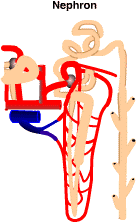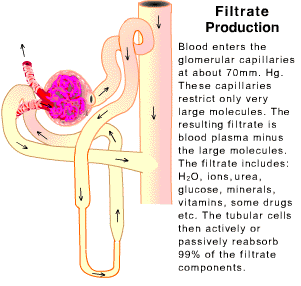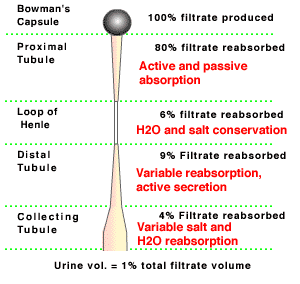Review of Kidney
Function
The kidneys are a pair of fist-sized organs located outside
the peritoneal cavity on each side of the spine. Together with the skin and
the respiratory system, the kidneys are the body's primary excretory organs.
The kidney is a highly specialized organ that maintains the internal environment
of the body by selectively excreting or retaining various substances according
to specific body needs. The importance of urine formation and excretion as a
life-sustaining function is highlighted in situations in which kidney function
is suddenly lost. Without at least one functioning kidney, death can occur within
a few days.
Urine is a very complex fluid comprised of 95%
water and 5% solids. The approximately one to one and one-half liters of urine
excreted each day are the end product of metabolism carried out by billions
of cells in the renal and urinary systems.
 The nephron is the kidney's primary
functional unit. Each kidney has about 1 million nephrons. Each
nephron contains a filtering system known as a glomerulus, and a
tubule, through which the filtered liquid passes. Each glomerulus
consists of a capillary network surrounded by a membrane called
Bowman's capsule. The afferent arteriole carries blood from the
renal artery into the glomerulus, where it divides to form a
circulatory network. At the distal end of the glomerulus, the
capillaries rejoin to form the efferent arteriole through which
blood leaves the glomerulus.
The nephron is the kidney's primary
functional unit. Each kidney has about 1 million nephrons. Each
nephron contains a filtering system known as a glomerulus, and a
tubule, through which the filtered liquid passes. Each glomerulus
consists of a capillary network surrounded by a membrane called
Bowman's capsule. The afferent arteriole carries blood from the
renal artery into the glomerulus, where it divides to form a
circulatory network. At the distal end of the glomerulus, the
capillaries rejoin to form the efferent arteriole through which
blood leaves the glomerulus.
A large amount of circulating blood flows through the kidneys.
Approximately 25% of the cardiac output or 1200 ml of blood per minute is received
by the kidneys. One liter of urine is the end product of more than 1000 liters
of circulating blood processed through the kidneys. Urine formation begins in
the glomerular capillaries, with dissolved substances passing into the proximal
tubule as a result of the force of blood pressure in the large afferent arteriole
and the pressure in Bowman's capsule.
 The renal tubule is responsible for reabsorption
and secretion. Reabsorption is the process of moving solutes from the tubules
and reabsorbing or returing them to the bloodstream. Some substances such as
glucose and sodium are reabsorbed until the plasma level reaches a specific
concentration known as the renal threshold. Secretion is the process of transporting
solutes into the renal tubule so that they can be excreted in the urine. Secretion
allows substances such as hydrogen ions to be eliminated at a rate that exceeds
glomerular filtration. Both reaborption and secretion are controlled by the
selective permeability of different areas of the renal tubule to water, sodium,
and urea (a by-product of protein metabolism) and the response of the distal
collecting tubules in the kidney to hormones such as aldosterone, antidiuretic
hormone, and parathyroid hormone.
The renal tubule is responsible for reabsorption
and secretion. Reabsorption is the process of moving solutes from the tubules
and reabsorbing or returing them to the bloodstream. Some substances such as
glucose and sodium are reabsorbed until the plasma level reaches a specific
concentration known as the renal threshold. Secretion is the process of transporting
solutes into the renal tubule so that they can be excreted in the urine. Secretion
allows substances such as hydrogen ions to be eliminated at a rate that exceeds
glomerular filtration. Both reaborption and secretion are controlled by the
selective permeability of different areas of the renal tubule to water, sodium,
and urea (a by-product of protein metabolism) and the response of the distal
collecting tubules in the kidney to hormones such as aldosterone, antidiuretic
hormone, and parathyroid hormone.
The kidney has a remarkable ability
to dilute or concentrate urine, according to an individual's changing physiological
needs, and to regulate electrolyte excretion. Impaired renal function has adverse
effects on blood chemistry, blood pressure, fluid balance, nutrient intake,
and the person's general state of health. When kidney function becomes compromised
by disease, the processes of glomerular filtration and renal tubular reabsorption
and secretion become affected. Blood and urine biochemical tests reflect the
extent of this dysfunction. Renal function tests are used to screen for kidney
disease, to help determine the cause of kidney disease, the to determine the
extent of renal dysfunction.
 Renal failure
is a loss of renal function characterized by uremia, the retention of nitrogenous
wastes in the blood. Acute renal failure is rapid in onset and can often be
reversed. Acute renal failure is classified as prerenal, renal, and postrenal
failure. Prerenal failure is caused by decreased blood flow to the kidneys,
as occurs with congestive heart failure. Renal failure results from injury to
the kidney’s glomeruli and tubules. The most common causes of renal failure
are glomerulonephritis, pyelonephritis, and tubular damage caused by drugs,
heavy metals, and viral infection. Post renal failure is caused by obstruction
in the urinary tract below the kidneys. This can occur from urinary tract stones,
tumors, and anatomic obstruction due to benign prostatic hypertrophy. Chronic
renal failure has a slow onset, may follow episodes of acute renal failure,
and is not reversible. Chronic renal failure often results from acute glomerulonephritis
or pyelonephritis. Other reasons for chronic renal failure include diabetes
mellitus, atherosclerosis of the renal blood vessels, hypertension, polycystic
kidney disease, and kidney stones.
Renal failure
is a loss of renal function characterized by uremia, the retention of nitrogenous
wastes in the blood. Acute renal failure is rapid in onset and can often be
reversed. Acute renal failure is classified as prerenal, renal, and postrenal
failure. Prerenal failure is caused by decreased blood flow to the kidneys,
as occurs with congestive heart failure. Renal failure results from injury to
the kidney’s glomeruli and tubules. The most common causes of renal failure
are glomerulonephritis, pyelonephritis, and tubular damage caused by drugs,
heavy metals, and viral infection. Post renal failure is caused by obstruction
in the urinary tract below the kidneys. This can occur from urinary tract stones,
tumors, and anatomic obstruction due to benign prostatic hypertrophy. Chronic
renal failure has a slow onset, may follow episodes of acute renal failure,
and is not reversible. Chronic renal failure often results from acute glomerulonephritis
or pyelonephritis. Other reasons for chronic renal failure include diabetes
mellitus, atherosclerosis of the renal blood vessels, hypertension, polycystic
kidney disease, and kidney stones.
Instant Feedback:
Reabsorption
of water and physiologically necessary substances occurs in the renal tubules.
 The nephron is the kidney's primary
functional unit. Each kidney has about 1 million nephrons. Each
nephron contains a filtering system known as a glomerulus, and a
tubule, through which the filtered liquid passes. Each glomerulus
consists of a capillary network surrounded by a membrane called
Bowman's capsule. The afferent arteriole carries blood from the
renal artery into the glomerulus, where it divides to form a
circulatory network. At the distal end of the glomerulus, the
capillaries rejoin to form the efferent arteriole through which
blood leaves the glomerulus.
The nephron is the kidney's primary
functional unit. Each kidney has about 1 million nephrons. Each
nephron contains a filtering system known as a glomerulus, and a
tubule, through which the filtered liquid passes. Each glomerulus
consists of a capillary network surrounded by a membrane called
Bowman's capsule. The afferent arteriole carries blood from the
renal artery into the glomerulus, where it divides to form a
circulatory network. At the distal end of the glomerulus, the
capillaries rejoin to form the efferent arteriole through which
blood leaves the glomerulus.  The renal tubule is responsible for reabsorption
and secretion. Reabsorption is the process of moving solutes from the tubules
and reabsorbing or returing them to the bloodstream. Some substances such as
glucose and sodium are reabsorbed until the plasma level reaches a specific
concentration known as the renal threshold. Secretion is the process of transporting
solutes into the renal tubule so that they can be excreted in the urine. Secretion
allows substances such as hydrogen ions to be eliminated at a rate that exceeds
glomerular filtration. Both reaborption and secretion are controlled by the
selective permeability of different areas of the renal tubule to water, sodium,
and urea (a by-product of protein metabolism) and the response of the distal
collecting tubules in the kidney to hormones such as aldosterone, antidiuretic
hormone, and parathyroid hormone.
The renal tubule is responsible for reabsorption
and secretion. Reabsorption is the process of moving solutes from the tubules
and reabsorbing or returing them to the bloodstream. Some substances such as
glucose and sodium are reabsorbed until the plasma level reaches a specific
concentration known as the renal threshold. Secretion is the process of transporting
solutes into the renal tubule so that they can be excreted in the urine. Secretion
allows substances such as hydrogen ions to be eliminated at a rate that exceeds
glomerular filtration. Both reaborption and secretion are controlled by the
selective permeability of different areas of the renal tubule to water, sodium,
and urea (a by-product of protein metabolism) and the response of the distal
collecting tubules in the kidney to hormones such as aldosterone, antidiuretic
hormone, and parathyroid hormone.  Renal failure
is a loss of renal function characterized by uremia, the retention of nitrogenous
wastes in the blood. Acute renal failure is rapid in onset and can often be
reversed. Acute renal failure is classified as prerenal, renal, and postrenal
failure. Prerenal failure is caused by decreased blood flow to the kidneys,
as occurs with congestive heart failure. Renal failure results from injury to
the kidney’s glomeruli and tubules. The most common causes of renal failure
are glomerulonephritis, pyelonephritis, and tubular damage caused by drugs,
heavy metals, and viral infection. Post renal failure is caused by obstruction
in the urinary tract below the kidneys. This can occur from urinary tract stones,
tumors, and anatomic obstruction due to benign prostatic hypertrophy. Chronic
renal failure has a slow onset, may follow episodes of acute renal failure,
and is not reversible. Chronic renal failure often results from acute glomerulonephritis
or pyelonephritis. Other reasons for chronic renal failure include diabetes
mellitus, atherosclerosis of the renal blood vessels, hypertension, polycystic
kidney disease, and kidney stones.
Renal failure
is a loss of renal function characterized by uremia, the retention of nitrogenous
wastes in the blood. Acute renal failure is rapid in onset and can often be
reversed. Acute renal failure is classified as prerenal, renal, and postrenal
failure. Prerenal failure is caused by decreased blood flow to the kidneys,
as occurs with congestive heart failure. Renal failure results from injury to
the kidney’s glomeruli and tubules. The most common causes of renal failure
are glomerulonephritis, pyelonephritis, and tubular damage caused by drugs,
heavy metals, and viral infection. Post renal failure is caused by obstruction
in the urinary tract below the kidneys. This can occur from urinary tract stones,
tumors, and anatomic obstruction due to benign prostatic hypertrophy. Chronic
renal failure has a slow onset, may follow episodes of acute renal failure,
and is not reversible. Chronic renal failure often results from acute glomerulonephritis
or pyelonephritis. Other reasons for chronic renal failure include diabetes
mellitus, atherosclerosis of the renal blood vessels, hypertension, polycystic
kidney disease, and kidney stones.